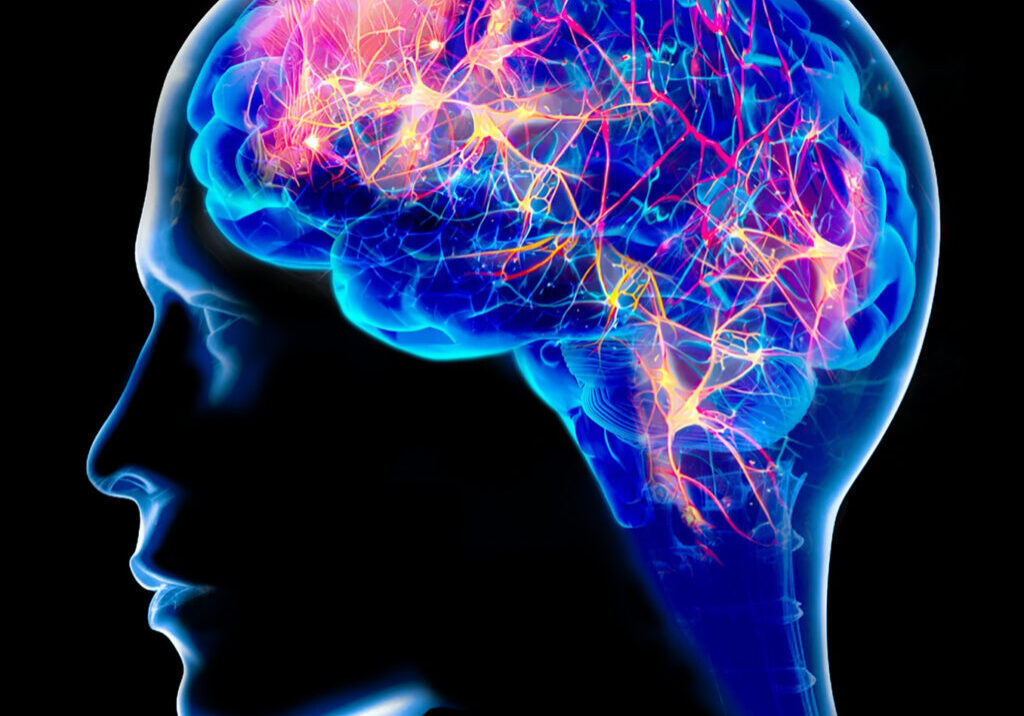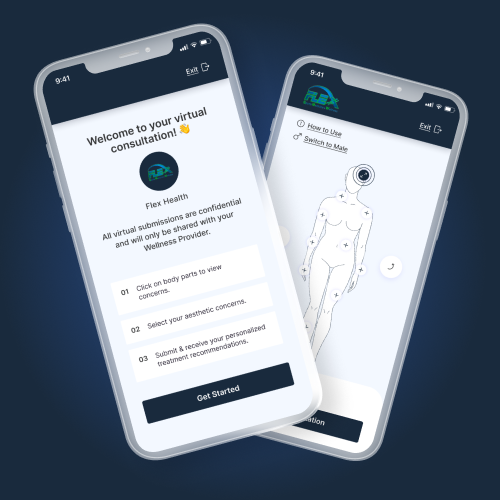
Depression is one of the most common mental health conditions in the world, and for some people, traditional treatments don’t work as well as they hope. Medications, talk therapy, and lifestyle changes can be helpful—but not always enough on their own.
That’s where Transcranial Magnetic Stimulation (TMS) comes in—a treatment that’s been gaining more attention in recent years, especially for individuals with treatment-resistant depression.
At Flex Health, we offer a form of TMS called EXOMIND, which uses advanced technology to customize treatment for each individual patient. This guide will help you understand how personalized TMS works, why EXOMIND is different, who it might help, and what to expect if you choose to explore this option.
What Is TMS?
Transcranial Magnetic Stimulation (TMS) is a non-invasive procedure that uses magnetic fields to stimulate nerve cells in specific areas of the brain, particularly those involved in mood regulation.
For people with depression, brain activity in these areas can often be reduced or “underactive.” By using magnetic pulses, TMS can help reactivate these circuits, improving mood and mental health over time.
How TMS Works:
-
Magnetic pulses are directed to specific parts of the brain.
-
These pulses stimulate nerve cells involved in controlling mood.
-
Over time, with repeated sessions, this stimulation can lead to better emotional balance and symptom relief.
Is it safe?
TMS has been FDA-approved for depression since 2008, with thousands of studies supporting its effectiveness. It’s considered safe for most people and does not require anesthesia or medications to work. Common side effects are mild and usually include temporary discomfort on the scalp or slight headache.
Success Rates:
A 2023 study published in The Journal of Clinical Psychiatry showed that about 68% of patients with treatment-resistant depression reported significant symptom improvement after completing TMS therapy. (Source: Journal of Clinical Psychiatry)
How Is EXOMIND Different from Traditional TMS?
Traditional TMS uses a set pattern of stimulation for every patient. While this can work well for many, it’s not tailored to how an individual’s brain responds in real time.
EXOMIND takes this a step further by making TMS personalized.
What Makes EXOMIND Unique:
-
Real-time adjustments: EXOMIND uses advanced technology to measure how your brain is responding and adjust treatment accordingly.
-
Individualized stimulation patterns: Instead of a one-size-fits-all approach, EXOMIND creates a stimulation plan tailored to your unique brain activity.
-
More efficient treatments: Early data suggests that personalized TMS may lead to faster results for some individuals compared to standard protocols.
This personalized approach reflects a growing trend in healthcare: tailoring treatments to the individual, not just the diagnosis.
Who Might Benefit from TMS Therapy?
TMS, including EXOMIND, is typically recommended for individuals with major depressive disorder (MDD) who haven’t found enough relief from medications or psychotherapy alone.
You may want to consider TMS if:
-
You’ve tried two or more antidepressant medications without significant improvement.
-
You’re experiencing side effects from medications that make it difficult to continue them.
-
You prefer to explore non-drug treatment options for managing your depression.
-
Your depression symptoms significantly interfere with your daily life.
It’s important to note that TMS is usually not recommended for people who have metal implants in or near the head, or for those with certain types of neurological conditions. A qualified medical professional can help determine if TMS is safe for you.
✅ FDA-Approved Conditions (in the U.S.):
-
Major Depressive Disorder (MDD) — especially treatment-resistant depression (TRD)
-
Obsessive-Compulsive Disorder (OCD) (using deep TMS with specialized coils)
⚙️ Common Off-Label / Investigational Uses (Growing Evidence):
-
Anxiety Disorders (e.g., Generalized Anxiety Disorder)
-
Post-Traumatic Stress Disorder (PTSD)
-
Bipolar Depression (depressive phase only; caution in mania)
-
Chronic Pain Conditions (e.g., fibromyalgia)
-
Migraine Headaches (FDA-approved for acute treatment using single-pulse TMS; personalized rTMS like EXOMIND is still investigational for prevention)
-
Tinnitus (ringing in the ears)
-
Addiction / Substance Use Disorders (e.g., alcohol, nicotine, cocaine)
-
Schizophrenia (negative symptoms or auditory hallucinations)
-
Autism Spectrum Disorder (ASD) (primarily in research for improving cognitive and social function)
-
Attention-Deficit/Hyperactivity Disorder (ADHD)
-
Alzheimer’s Disease / Cognitive Impairment (research ongoing for slowing progression or improving cognition)
-
Parkinson’s Disease (Motor Symptoms & Depression)
-
Stroke Rehabilitation (post-stroke motor recovery)
-
Neuropathic Pain
-
Borderline Personality Disorder (BPD) (early research for emotional regulation)
-
Anorexia Nervosa / Eating Disorders (early-stage research)
-
Multiple Sclerosis (MS)-Related Fatigue
🧠 Emerging / Experimental Areas of Study:
-
Post-Concussion Syndrome
-
Insomnia / Sleep Disorders
-
Depersonalization-Derealization Disorder
-
Restless Legs Syndrome (RLS)
-
Essential Tremor
-
Traumatic Brain Injury (TBI) Recovery
-
Sexual Dysfunction (linked to depression/anxiety treatment)
⚠️ Important Notes:
-
Personalized TMS like EXOMIND could potentially enhance treatment response across many of these conditions due to its real-time brain feedback and adaptive stimulation.
-
Evidence strength varies. Depression and OCD have the strongest clinical support; others are promising but need more large-scale, peer-reviewed studies.
What Does a TMS Session Look Like?
Many people imagine medical treatments as complicated or uncomfortable, but TMS is straightforward and designed to be as easy as possible for patients.
Typical Treatment Experience:
-
Comfortable seating: You remain fully awake during treatment, sitting comfortably in a chair.
-
Device placement: A small magnetic coil is positioned over a targeted area of your scalp.
-
Magnetic pulses: During treatment, you may feel a gentle tapping sensation on your scalp.
-
Duration: Sessions typically last between 20 to 30 minutes.
-
Post-session: There’s no downtime—you can return to work, school, or your daily activities immediately afterward.
Most treatment plans involve sessions (one-two days a week) for three to six weeks depending on weekly frequency. Adjustments to this schedule depend on the specific needs of each patient.
How Effective Is Personalized TMS?
Research is ongoing to fully understand the benefits of personalized TMS like EXOMIND. However, preliminary studies suggest that tailoring the stimulation to each patient’s needs may lead to:
-
Shorter time to noticeable improvement in mood symptoms
-
Reduced need for medication adjustments during treatment
-
Higher likelihood of symptom remission in some patients compared to standard TMS
It’s important to emphasize that, as with any medical treatment, results vary from person to person. TMS works very well for some, moderately for others, and in rare cases may not provide meaningful symptom relief.
How Does TMS Compare to Other Depression Treatments?
|
Treatment |
Involves Medication? |
Invasive? |
Side Effects? |
Average Success Rate |
|
Talk Therapy |
No |
No |
Minimal to none |
Varies (about 60-70%) |
|
Medication |
Yes |
No |
Possible side effects |
Varies (about 60-70%) |
|
TMS (EXOMIND) |
No |
No |
Mild scalp discomfort |
~68% response rate |
|
ECT |
No |
Yes (Anesthesia) |
Temporary memory issues |
70-90% for severe MDD |
For individuals who haven’t experienced meaningful results from standard therapy and medication, TMS offers another tool in the toolkit for managing depression.
Questions to Ask Before Starting TMS
-
Have I tried multiple medications for depression without success?
-
Am I experiencing significant side effects from my current treatments?
-
Am I looking for a non-drug option to add to or replace my current depression treatment?
-
Do I have any medical conditions that might make TMS unsafe?
These questions can help guide conversations with your healthcare provider as you explore whether TMS with EXOMIND is a good fit for your situation.
Further Reading & Resources:
-
Understanding Depression – National Institute of Mental Health (NIMH)
- World Psychiatry – Efficacy and safety of deep transcranial magnetic stimulation for major depression: a prospective multicenter randomized controlled trial
Conclusion
Depression affects millions of people, and for some, standard treatments just don’t go far enough. Personalized TMS with EXOMIND represents a promising option for those searching for relief after trying medications and therapy without the success they hoped for.
If you’re exploring new ways to manage your mental health, learning about treatment options like personalized TMS is a great place to start. Speaking with a healthcare provider familiar with this technology can help you decide whether this approach aligns with your personal needs and treatment goals.
Social Media Promotional Snippets
Facebook:
Did you know? TMS is a medication-free treatment option for depression that uses magnetic pulses to stimulate brain activity. Personalized versions like EXOMIND may help some patients see results faster. Learn more about how it works → [Link]
Instagram:
Feeling stuck with depression? 💭 Discover how Personalized TMS Therapy with EXOMIND uses advanced technology to help “reboot” brain pathways involved in mood. It’s safe, non-invasive, and tailored to you. More at [Link] 🧠 #MentalHealthAwareness #TMS #BrainHealth
X (Twitter):
Struggling with depression that meds haven’t fixed? TMS with EXOMIND is an option worth exploring. No meds. No surgery. Just science helping your brain reconnect. 🧠 Learn more: [Link] #MentalHealth #DepressionTreatment



